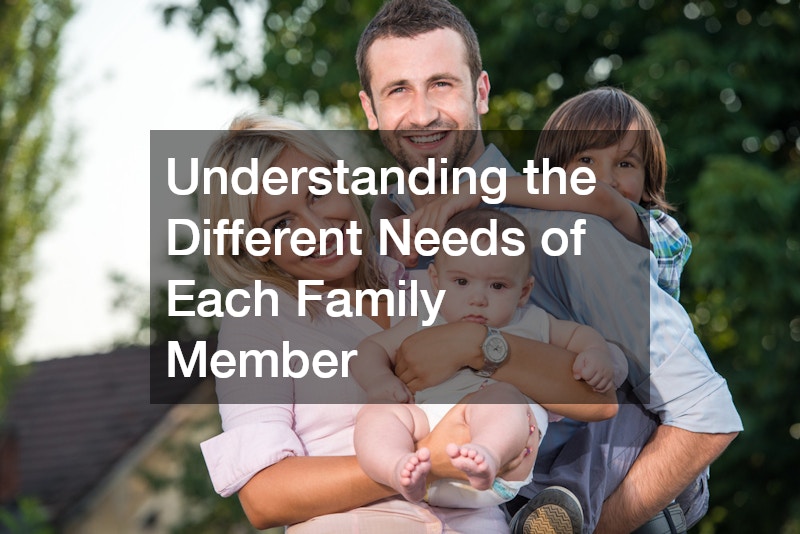Every family experiences challenges, transitions, and difficult seasons. Whether it’s emotional struggles, academic pressures, financial difficulties, health concerns, or major life changes, each family member needs support in different ways. What one person finds overwhelming, another may navigate more easily. What a child needs to feel secure isn’t the same as what a teenager needs to feel understood, or what a parent needs to feel capable, or what a grandparent needs to feel valued.
Supporting each family member requires patience, empathy, active listening, and a willingness to adapt. Families are strongest when everyone feels seen, heard, respected, and encouraged during life’s hardest moments. Understanding how to support one another creates a foundation of trust and connection that lasts a lifetime.
This guide explores how to help each family member—children, teens, parents, partners, and elders—through the many challenges life brings, while strengthening relationships along the way.

Understanding the Different Needs of Each Family Member
Every person in a family has their own personality, fears, hopes, and challenges. The support they need depends on their stage of life, emotional development, and personal circumstances.
Children: Support Rooted in Stability
Children depend heavily on predictability and emotional reassurance. When they face challenges such as school pressure, social changes, or big life transitions, they often express their struggles through behavior rather than words. Providing patience, consistent routines, and open communication helps them feel grounded. Simple acts like reading together, spending quality time, and validating feelings go a long way in helping children feel safe.
Teenagers: Support Rooted in Understanding
Adolescence is filled with identity exploration, social pressure, academic expectations, and emotional highs and lows. Teens want independence but still crave acceptance and guidance. Active listening, respecting their emotions, and offering nonjudgmental advice help teenagers feel understood. Encouraging healthy habits and being available without being intrusive builds trust.
Adults: Support Rooted in Partnership
Parents and caregivers often carry the greatest responsibilities—raising kids, maintaining homes, working jobs, and managing finances. They may feel isolated, overwhelmed, or pressured to balance everything perfectly. Offering emotional support, sharing household responsibilities, and simply saying “I’m here for you” can ease the burden.
Elder Family Members: Support Rooted in Dignity
Older family members may struggle with loss of independence, health issues, or loneliness. Treating them with respect, including them in decisions, and spending meaningful time with them reinforces their sense of belonging and dignity.
When life transitions arise, families sometimes seek the guidance of professionals such as those who assist with estate planning, helping older relatives feel secure about their future arrangements.
Supporting Emotional Challenges Within the Family
Emotional struggles are common across all ages—anxiety, stress, sadness, insecurity, or confusion often affect multiple family members at once. Offering emotional support is essential.
Practice Active and Compassionate Listening
Listening without interrupting, judging, or jumping to solutions is one of the greatest gifts you can give. This type of listening helps family members feel respected and understood. Ask open-ended questions and reflect back what you hear to show empathy.
Encourage Expressing Emotions in Healthy Ways
Whether through conversation, journaling, art, movement, or professional counseling, every family member should have an outlet for personal expression. Normalizing emotional conversations strengthens trust.
Validate Feelings, Even When You Don’t Agree
Validation doesn’t mean agreeing—it means acknowledging their feelings as real and important. Avoid minimizing comments like “You’re overreacting” or “It’s not a big deal.”
Seek Professional Help When Needed
If emotional struggles become overwhelming, families can explore resources such as therapists, counselors, or a medical wellness clinic where mental and physical well-being are connected.
Learning to support emotional challenges builds a foundation of resilience within the family.

Supporting Family Members Through Physical Challenges
Physical challenges—illness, injury, chronic conditions, or sudden health problems—affect the entire household. Knowing how to respond brings comfort and stability.
Promote a Healthy Lifestyle Together
Families who cook balanced meals, encourage hydration, and stay active together often cope better with physical stress. Modeling healthy habits teaches children long-term wellness skills.
Make Medical Care Accessible and Stress-Free
Sometimes health concerns appear suddenly. In these cases, convenient services such as walk in clinics can provide prompt care without scheduling delays. Offering to accompany a loved one to appointments shows solidarity.
Adapt the Home for Comfort
Small adjustments such as setting up rest areas, improving lighting, or providing supportive seating can help family members recovering from illness or injury.
Offer Patience and Compassion
Physical challenges often bring frustration, fatigue, or discouragement. Encouragement and understanding help loved ones stay motivated on the road to recovery.
Supporting Academic and Developmental Challenges
School, learning, and development affect children and teens in profound ways. Support from the family plays a major role in their success.
Offer Homework Help Without Pressure
Assist with homework, but avoid turning it into a battleground. Instead, create a structured study environment with clear expectations and encouragement.
Promote Learning Outside the Classroom
Read together, explore museums, practice real-world math, and discuss interesting topics. These experiences create confident, curious children.
Encourage Social Development
Friendship struggles, bullying, and peer pressure can be overwhelming. Talk openly about these experiences and provide guidance on communication, boundaries, and self-esteem.
Consider Educational Alternatives When Needed
Some families explore opportunities like private school education when children thrive better in a different learning environment. Others consider the financial commitment of student loans when preparing older teens for their academic futures.
Celebrate Growth, Not Just Achievements
Praise effort, resilience, and progress. Emphasizing these qualities builds long-term confidence and reduces fear of failure.

Supporting Career and Financial Challenges
The pressures of work, job stability, budgeting, and major financial decisions can impact every adult in the family.
Practice Open Financial Communication
Families who communicate honestly about budgeting, bills, and financial goals reduce misunderstandings and anxiety. Transparency also teaches children financial literacy.
Create a Supportive Work-Life Balance
Encourage realistic work schedules, regular breaks, and boundaries around work communication. Support one another in pursuing career advancement, entrepreneurship, or continuing education.
Stand Together in Times of Job Loss or Transition
Losing a job is emotionally and financially stressful. Offering reassurance, helping with job searches, and adjusting household responsibilities create unity during uncertain times.
Plan for Future Stability
Saving money, reducing debt, and exploring investment options create long-term security. Some families also research the best private schools for their children as part of long-term planning.
Supporting a Family Member Through Major Life Transitions
Life is full of transitions—marriage, divorce, moving, retirement, college, parenthood, or becoming a caregiver. Each transition brings emotional layers that require family support.
Moving to a New Home
Moving brings excitement but also disruption. Be patient with children adjusting to a new school, teenagers missing friends, or adults dealing with the complexities of relocation.
Welcoming a New Baby
A growing family means shifting responsibilities, less sleep, and emotional adjustments. Supporting the new parents through meals, chores, and encouragement helps everyone.
Starting College or a New Career
Young adults need support as they navigate independence. Stay connected through calls, messages, and occasional visits while allowing them room to grow.
Retirement
Retirement can bring identity shifts or questions about purpose. Offering companionship, including older relatives in activities, and honoring their experiences strengthens family unity.

Supporting Through Home and Household Challenges
Families face challenges related to home maintenance, emergencies, and everyday responsibilities.
When Unexpected Damage Strikes
Storms, leaks, and home wear can create financial stress and emotional overwhelm. Coordinating repairs, gathering information, and offering practical help relieves pressure on the person responsible.
Some homeowners also seek support from professionals such as residential roofing experts to handle weather-related or structural concerns that affect the family home.
Managing Household Responsibilities
Chores and daily tasks should not fall on one person. Share responsibilities to reduce stress and avoid resentment.
Helping When Something Breaks
If a family member’s belongings are damaged—such as a treasured item—offering emotional reassurance and exploring solutions such as jewelry repairs can help them feel supported.
Handling Seasonal Challenges
Winter heating bills, summer maintenance, and unexpected emergencies can strain families. Coordinating tasks and sharing workloads make these responsibilities easier.
Supporting Social and Community Challenges
Navigating relationships outside the home is a major part of life.
Helping Children Build Friendships
Support kids by arranging playdates, teaching conflict resolution, and encouraging empathy.
Supporting Teens Through Peer Pressure
Teens often face pressure to fit in. Listen without judgment and offer guidance rooted in understanding, not control.
Supporting Adults Through Social Shifts
Friendships may change after having children, moving, or starting new jobs. Encourage making time for meaningful relationships.
Celebrating Milestones Together
Birthdays, graduations, promotions, and achievements strengthen family bonds. For large gatherings, families sometimes rely on party event rentals to help create memorable celebrations without added stress.
Supporting Health and Wellness Goals
Health affects the entire family. Supporting wellness creates strength, resilience, and longevity.
Encourage Preventive Care
Annual checkups, dental visits, eye exams, and health screenings catch issues early.
Support Mental Health Priorities
Encourage self-care routines, breaks, hobbies, and mindfulness practices. Normalize therapy and mental health care.
Promote Healthy Home Habits
Cooking nutritious meals, exercising together, and getting enough sleep support long-term wellness.
Manage Chronic Conditions With Compassion
When someone struggles with chronic pain or medical limitations, emotional support is as important as physical care.
Maintain a Safe and Comfortable Home Environment
For seasonal comfort, some families seek reliable heating service to keep the home safe and warm during colder months.
Supporting Family Members Through Unexpected Crises
Crises—big or small—test the strength of a family.
Stay Calm and Supportive
Reacting calmly helps those involved feel safe. Avoid blame or panic.
Assist With Problem-Solving
Offer solutions or help research options. Even small support can make a big difference.
Provide Emotional Encouragement
Reassure loved ones that they’re not alone. Emotional support builds resilience.
Reinforce Family Values
During hard times, leaning on shared values—such as loyalty, kindness, and responsibility—creates unity.
Supporting Growth, Dreams, and Long-Term Goals
Support isn’t just about helping during hard times. It’s also about encouraging growth and celebrating progress.
Celebrate Achievements of All Sizes
Small wins deserve appreciation. This builds pride and motivation.
Encourage Personal Development
Whether someone wants to learn a new skill, return to school, or develop a hobby, family support strengthens confidence.
Support Career Goals
Offer help with résumés, interview practice, or networking.
Model Long-Term Planning
Teach younger family members the importance of setting goals and working toward them.
Supporting each family member through life’s challenges is not something that happens only during crises; it is a lifelong practice rooted in presence, empathy, and intentional connection. Families grow stronger not because they avoid hardship, but because they choose to face it together. Every challenge—large or small—creates an opportunity to reinforce the bonds that hold a family together and to build a sense of unity, emotional safety, and shared resilience. When one person struggles, the strength of the family becomes the bridge that carries them from uncertainty back to stability.
At its core, support begins with emotional availability. Being willing to pause, listen, and sit with someone in their discomfort communicates love more loudly than any advice ever could. Family members don’t always need solutions; sometimes they simply need reassurance that they don’t have to navigate life alone. In these quiet moments, connection deepens. Over time, these seemingly small acts of compassion become the defining threads of the family’s story—threads woven through patience, understanding, and shared experience.
But support also means recognizing the individuality of each family member. Each person faces challenges differently. Younger children seek stability and reassurance; teenagers search for acceptance and autonomy; adults need partnership and understanding; and older family members crave dignity, respect, and meaningful connection. Honoring these differences shows that love within a family is flexible—it expands, adapts, and responds to each person’s unique path. When families acknowledge that everyone’s journey looks different, they create a home where individuals feel safe to express themselves without fear of judgment.
When families commit to these values, they create a legacy of unity that lasts far beyond the challenges themselves. They become not just individuals living under one roof, but a deeply connected community of love—capable of weathering any season, overcoming any obstacle, and growing stronger with every shared experience.
